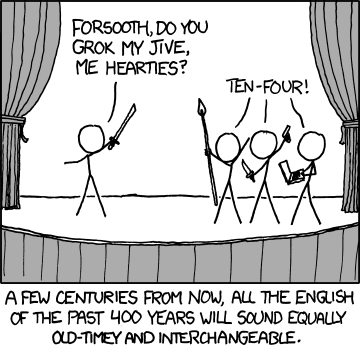In appropriateness for Thanksgiving, the question of the nature of thanks.
In an etymological discussion on Google+, back in July, which some of you may remember, in which various languages’ ways of saying “thank you” were discussed and their comparative original meanings – in terms of obligation, or gratitude, or mercy, or indeed the fascinating etymology of the Japanese arigato, I was asked how Eldraeic does this. And so, I answered, and I thought while I was at it I would save the substance of that comment for today’s blog article:
It is, of course, a somewhat complex question filled with tasty nuance. Sadly, it is also a complex question filled with etymological detail which I didn’t have to hand then, and since my brain has been busy with other things in the meantime, I still don’t have now, which teaches me to put things on the back burner, I guess. Still, while I don’t have those details available because I have yet to work out how these words would have run in Cestian and Selenarian and so forth before determining their descendants in good old modern Eldraeic, I can talk somewhat about meanings.
Of course, in Eldraeic, it’s all about obligation. Because of coválír and mélith, which for new readers are defined over here, and I talk some more about how they play out in language here. To Eldraeic’s original native speakers, and to those Imperially acculturated, obligation is a spiritual value, a founding principle of civilization, and a measure of moral worth all wrapped up in a single package. And for eldrae, in particular, it’s something about which they get instinctually twitchy in ways that humans simply can’t feel, so.
Thus, there are three combinations in Eldraeic that take the place of our “thank you” / “you’re welcome” pair. In either of the first two, the thanking party opens with “I am indebted”. The first possible response here, used for originating transactions, amounts to “It is known/acknowledged/recorded.” (The word here, based on the etymological notes that I do have, is now specific to this circumstance, but links back to older words relating to knots, tieing, weaving, etc., which is how they used to keep account-books in archaic times.)
I should also point up, probably, that while this might seem cold by human standards, declining to acknowledge/record someone’s offered debt is essentially blowing it off as not worth enough to bother with, which is a particularly insulting way to start a fight provoke someone to a duel. Yay for cross-cultural misunderstandings.
The other one, used for closing transactions when one is cancelling an existing debt, is “It is repaid,” which – oh, hey, more etymology – has links with words meaning “it balances”.
The third form is used in things like, say, buying something and paying for it right then, when the obligation is both incurred and paid off at the same moment. That one’s a worn down form of the old obligator closing that runs something along the lines of “Thus is our contract written; thus is agreement made.”, and it’s said each to each, probably simultaneously, at the close of the deal. You could also think of it as analogous to the Jacksonian “Deal”.
These apply, of course, principally to solicited transactions. Unsolicited ones – well, in their view of the world, you can do something that benefits someone else for your own internal reasons, but you can’t do something for them without their consent – because that would indebt them to you without their consent, and that’s something that only slavers, outworld barbarians, and other terminally uncultured people do. One can, however, declare oneself indebted to someone for something they didn’t do for you, which starts off the whole elegant verbal dance in which they try to persuade you that you’re not indebted (’cause they had their own internal reasons or another debtor, and got paid already) without insulting you by repudiating your debt, and you try to persuade them otherwise…
One might well ask how gratitude fits into this paradigm. Answer: badly, as we conceive of it, ’cause gratitude would imply a sense of indebtedness, and that would be incorrect and inappropriate because the debt has been either acknowledged as an obligation or already paid. It is done, and carrying it further would be a gross solecism.
What they do have, on the other hand, is appreciation – something which, per coválír , has its ties to such words as “appraise” acknowledged much more plainly that in human cultures, because they’re not ashamed to express value as value . Eldraeic is a language in which it is entirely reasonable and appropriate to say “I value your existence/this series of transactions/the [commercial/personal/etc.] relationship/your willingness to participate in this transaction” straight out, which while far from something that it’s appropriate to say every time you buy a cup of coffee, is something one might express to one’s frequent counterparty/regular butcher/favorite barista, etc., etc., as a statement appended to whichever of the above is relevant to whatever transaction you’ve just engaged in.
(It’s also the most appropriate statement to use to respond to things done that benefit-you-but-aren’t-for-you, which in most cases do not generally warrant going to the lengths of declaring oneself personally indebted.
This phrasing is also used to acknowledge gifts – given with no strings attached, for which there is a specific verb, “to-give-in-appreciation-of-your-value”, which I would more readily gloss as “to gift”, at least if we ignore blue-gifting – compliments and other such expressions, and so forth.)

